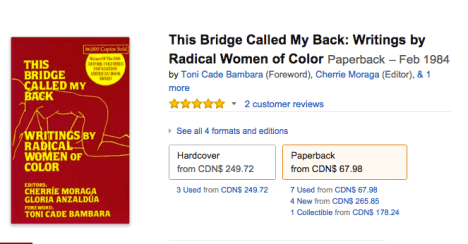On Thursday and Friday UVic hosted Lisa Nakamura, Collegiate Professor from the University of Michigan, to speak about her research on Digital Media and Race, Gender and Sexuality. Nakamura has been writing about digital media since 1994. While she has written several books about race and the internet, some of her shorter pieces focus on things like “The Racialization of Labour in World of Warcraft”. In order to feel qualified to write about platforms like World of Warcraft, she spent hours playing the game herself.

On Thursday, Nakamura’s talk was titled “The Digital Afterlife of This Bridge Called My Back: Women of Color, Feminism and the Internet”. She began by giving a brief overview of the book and explained why it matters so much.
As an anthology that prioritized written work by women of colour, This Bridge Called My Back responded to the whitewashing of feminism long before movements like the #SolidarityIsForWhiteWomen hashtag began to highlight the problem. This book also introduced the concept of intersectionality, which has since become a key element of feminist theory.
Unfortunately, since it’s original publication the groundbreaking collection has struggled to remain in print. According to Wikipedia,
“The anthology was first published in 1981 by Persephone Press, and the second edition was published in 1983 by Kitchen Table: Women of Color Press. The book was out in its third edition, published by Third Woman Press, until 2008, when its contract with Third Woman Press expired and it went out of print.”
The book’s struggle to remain in print made it an “artificially scarce commodity” and drove up the price. At its inflated price, the book’s authors might even have been unable to afford their own work.
However, if you search for This Bridge Called My Back on Tumblr, the home of the SJW (Social Justice Warrior) you will see that fans of the book have put together a free PDF version. While this PDF would not have technically been illegal when the book was out of publication, now that Suny press is producing a new edition the scanned PDF will be breaking copyright.
Nakamura’s presentation raised a lot of questions concerning publication. Should a text as important as This Bridge Called My Back be available, freely, to whoever might need it? If so, how can we compensate the authors of a text like this, since many of these authors had to continue working day jobs in order to support their writing?
It also raises questions about the role of Tumblr as a tool for grassroots activism.
Since Nakamura is still conducting research on this project, she closed her talk by opening the topic up for discussion. During this discussion period, several regular Tumblr users spoke up about their experience on the platform. While Nakamura seemed hopeful that Tumblr could offer a positive space for grassroots feminist activism on the internet, many of the student users seemed to believe that the platform faces too many struggles, both from within and without. Several students discussed the attacks on Tumblr and “Tumblrinas” by more male-dominated platforms like Reddit and 4Chan. Some students also described the social media site itself as bearing its own bias. They mentioned that Tumblr was recently accused of censoring the #Ferguson tag and even argued that it tends to privilege blogs by white users.
Despite these struggles, Tumblr has remained a useful platform for feminism to flourish. It has also become such an innate part of our culture landscape that it’s difficult to discuss many hot topic issues without addressing the role Tumblr played in helping those issues gain attention.
Here on the blog, we have mentioned Tumblr in several of our posts. Back in March, Evan wrote a Fame Day congradulating the Bronies Against Bullshit Tumblr for #SafeSearchWrapUp. A few weeks ago, I touched on Tumblr in my post about the Death of Leelah Alcorn. And Gordon recently discussed Tumblr in his posts on “White Guilt, Privilege and Justice” and “The Internet and Mob Justice“.
As Gordon mentioned in his last post, platforms like Tumblr can allow misinformation to travel very far, very fast, yet Tumblr has also provided University level materials to users who can’t afford post-secondary education. As a beginner on Tumblr myself, I’m still deciding what I think about the platform, but I would love to hear from you.
How do you use Tumblr? Do you think there is more, or less, discrimination on Tumblr than other platforms? And is Tumblr the powerful feminist platform it appear to be?




Pingback: Lisa Nakamura Part 2: Navajo Circuits and the “Nimble Fingers” of Asian Women | Culture War Reporters
Pingback: Can Video Games Make Thoughtful Social Critiques? | Culture War Reporters
Pingback: YouTube Feminism: Not Medium but Métier | MEDIA PRAXIS